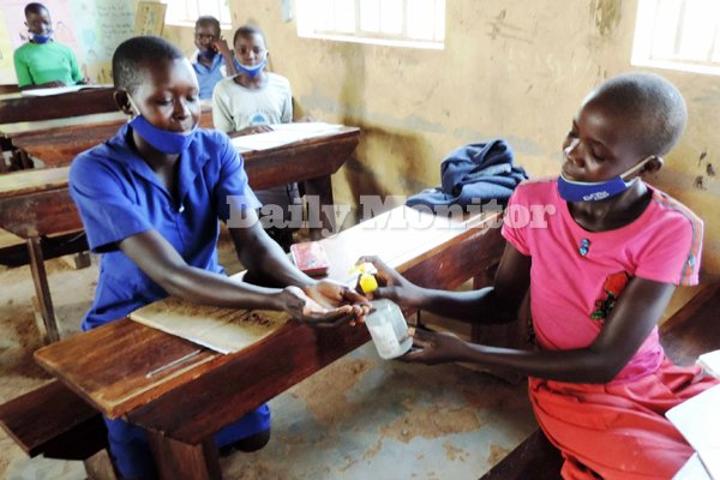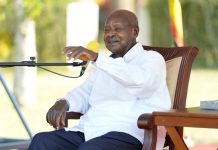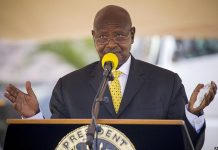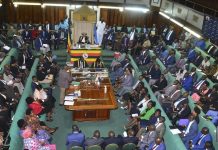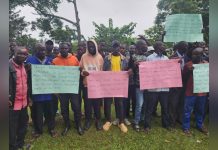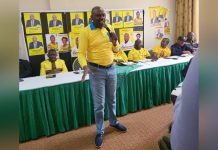Africa-Press – Uganda. President Museveni is today expected to announce the schedules for the reopening of schools as he addresses the nation on Covid-19 situation at 8pm.
In the address which comes 92 days after closing the education institutions to curb Covid-19 spread, and about 54 days after easing some of the Covid-19 lockdown restrictions, the President’s pronouncements about the fate of places of worship and bars as expected.
Mr Museveni, in his July 30 proclamation to ease lockdown measures, allowed transport and trade sectors to operate at half capacity, but kept schools, bars, churches and mosques and seasonal markets closed, saying they will be reopened after sufficient vaccination of eligible people.
There has been some increase in the number of jabbed citizens, with majority of the 1.6 receiving only first shots, a gain more broadly a minuscule portion of the 21.9 million Ugandans targeted for vaccination.
Signings for new line of vaccine streams have opened doors to possible supply of more than 20 million doses — mainly the single-shot Johnson & Johnson, although actual delivery timeline remains unspecified.
Besides a stock of Oxford-AstraZeneca vaccines expiring in 8 days, Uganda has, in two tranches, in total received slightly over 2.2 million doses of Moderna and Pfizer, expected to be deployed from next Monday.
The slow progress in nationwide vaccinations, on which the government premises full opening of the country, has raised limited optimism among parents eager to return their children to school and the religious, some of whom have gone to court to force opening of places of worship, jittery.
Last week, the National Covid-19 National Taskforce, according to some of its members, recommended to President Museveni that tertiary institutions should be allowed to resume operations in November while reopening of other educational institutions should be considered in a phased manner from next January.
The government expects that a sufficient segment of the population, especially the high-risk groups which total 4.8 million, would have been jabbed by then.
“There is no opening of schools in September and there is none in October [this year]. The reopening will be after October because of the limited number of priority groups vaccinated,” the source said.
According to government statistics, a total of 1.7 million out of 4.8 million of the high-risk groups have so far been vaccinated. But the government has so far received only about 4 million doses of double-shot vaccines which can inoculate at least 2 million people.
The closure of schools for the second time on June 18, locked about 15 million children in their homes and activists, experts and politicians have blamed the rampant cases of teenage pregnancies and child labour on prolonged closure.
Some educationists fear the decision will have a catastrophic future on literacy and human capital development in the country as neighbouring countries such as Kenya and Burundi keep schools open amid the pandemic.
The President and his wife Janet, who is the Education minister, have separately said that schools will reopen only after teachers, critical non-teaching staff and students aged 12 and above, get the Covid-19 shots.
However, the latest government statistics indicate that only 269,455 (45 per cent) of 550,000 teachers have received the first dose and a mere 90,000 have been fully vaccinated, meaning their immunity is less effective.
The government had planned to vaccinate at least 357,500 teachers, representing 65 per cent.
Following the reported government plan to unlock tertiary intuitions, the Director General for Health Services at the Ministry of Health, Dr Henry Mwebesa, last Friday wrote to Resident District Commissioners, calling for vaccination of all adult students.
But other top officials within the Ministry and other government scientists, who sought anonymity due to the sensitivity of the matter, questioned the move, saying they cannot start vaccinating young people who are at less risk of developing severe illness even when they catch Covid-19, which would crowd out the 4.8 million highly-vulnerable population in the wake of limited jabs.
“We need to make the best use of the limited resources. We cannot just jump and start vaccinating young people. Our target is to minimise severe disease and deaths and that requires that we first vaccinate those who are at high risk,” the source said.
Another source said: “Some of these directives are good for media [publicity], but does not make sense to the Covid-19 response. Some of these people [in government] know nothing about science [why we should prioritise vulnerable people].”
The friction within the government on who to prioritise is likely to impact planned schools’ reopening.
Prime Minister Robinah Nabbanja said two weeks ago that the government plans to complete vaccination of 4.8 million people by October and 11 million by December.
But the practicability of her pronouncement will be tested by how first the country gets more vaccines and the willingness of the nationals to take the jabs.
About 375,000 doses of vaccines from the over 2,152,840 doses dispatched to districts risk getting expired because of low uptake, according to information Ministry of Health.
The low uptake endures despite the pandemic in total killing 3,129 among 122,277 infected.
The State Minister for Primary Healthcare, Ms Margaret Muhanga, said the government’s reopening the economy depends on how quickly the 4.8 million people are vaccinated”.
“Once they [the high-risk groups] are vaccinated, we shall open the economy and everything including schools …,” she said in an earlier interview.
There religious leaders have in several instances blamed scientists for giving “wrong advice” to the President, arguing that fighting Covid-19 also requires divine intervention, not science alone.
Dr Joseph Serwadda, the head of Born Again Faith in Uganda, in a talk show on NTV earlier, said President Museveni is being advised by wrong scientists.
“I don’t know where we are headed because we have wrong scientists advising the President…If you think people can observe Standard Operating Procedures (SOPs) while in markets and buses, why do you think they can’t observe the same SOPs while in church?” Dr Serwadda said. He accused the government of plotting to kill churches.
Asked whether he expects the President to allow spectators, Mr Sadik Zaid Nasiwu, the President of Uganda Volleyball Federation, told this reporter that all he cares about is that the games are allowed to continue even without spectators.
“My team managed to train and go and compete in Kigali, [Rwanda African Volleyball Championships]. Most of our games are outdoor. I don’t want to comment on the President’s directive because I know he has competent people to advise him. Let us wait for his communique because National Council [of Sports] is always advising us. Let us wait,” he said.
What has changed?
While lifting the easing the Covid-19 measures on July 30, Mr Museveni lifted restrictions on public transport where each vehicle, was allowed to operate but strictly carry 50 per cent of its capacity to prevent the spread of the virus.
He also reopened the trade sector, permitting Kikuubo, one of the most crowded business centres in Kampala, arcades and malls and traders across the country to reopen shops.
At the easing of the lockdown measures on July 30, the country had registered 93,927 cumulative confirmed cases of Covid-19 and 2,690 deaths. But as of yesterday, the cumulative cases had shot up to 122,405 and virus death was at 3,130.
By July 30, the positivity rate was at 8 per cent, but it has been dropping over time and the average for the last three days was at 3.5 per cent.
Positivity rate is the proportion of people who test positive for the virus from the total number of samples tested, which makes it an important indicator for the trend of the pandemic.
The number of hospitalised patients then was 626, but it is now down by about half, at 381.
About 1.1 million people had been vaccinated by July 30, but currently a total of 1.7 million have been inoculated in the exercise which started on March 10.
STATUS QUO

